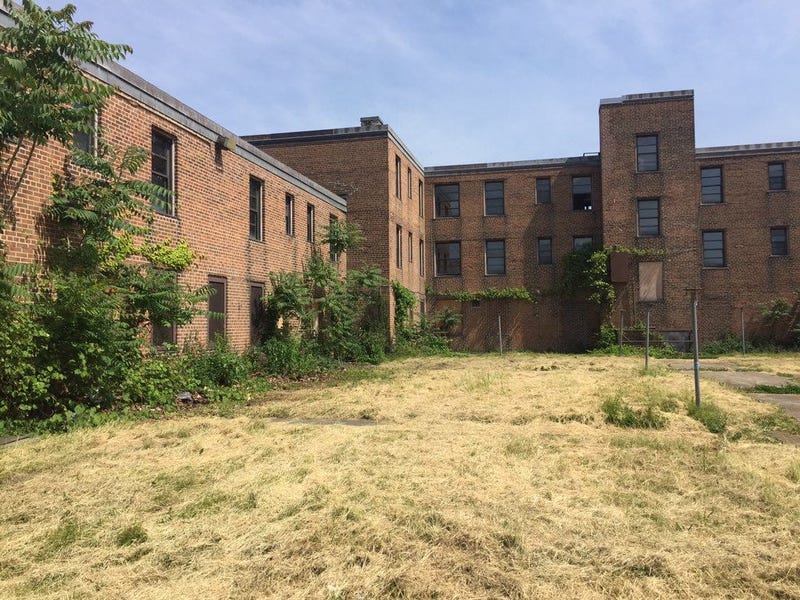
BUFFALO, N.Y. (WBEN) - Tearing down the 15 vacant buildings that make up parts of the Commodore Perry Complex in the City of Buffalo is not a new idea.
Carl Paladino is among those who, for years, have lobbied for the 222 units to be demolished.
READ MORE: Mayor Brown and Congressman Brian Higgins discuss vacant Perry Street homes
"I think I'm speaking on behalf of all those residents down there on the First Ward who, for years, have watched their property values depress because of the public nuisance sitting there," Paladino said. "It's just rotting. They're attracting nuisance, attracting rodents, and attracting bad people."
Why, then, hasn't the Buffalo Municipal Housing Authority, the organization that owns the property, demolished the buildings? Executive Director Gillian Brown said it's because of money.
"One way or another, those buildings have to come down," Brown said. "That is an extraordinarily expensive proposition. Demolishing that many units and that many buildings is a very expensive proposition. We have no plans to do anything immediately with the vacant buildings at Perry except to do what we need to do to be as responsible as we possibly can in terms of safeguarding the site, preventing illegal dumping, and keeping them boarded as safe as possible."
Demolition of those vacant buildings could cost the BMHA anywhere between $7 million and $10 million.
"My immediate concern has got to be to address the Perry development because those vacant units count against me," Brown said. "It's not as if it's a painless process for BMHA to just warehouse these units. I don't want them there. They don't do us any good. We're not purposely land-banking this property. They count against my vacancy rate and our annual HUD report. They're a liability, not an asset at this point."
According to its executive summary, the Commodore Perry property needs $66 million in improvements. The focus of those funds have been on the homes on Chicago Street and for the towers on Perry Street, both of which are occupied. The BMHA is utilizing a program called Rental Assistance Demonstration, which allows the BMHA to access private dollars to rehabilitate its distressed housing and convert the property to project-based Section 8. The summary said that once RAD transactions are complete, the BMHA can begin the process to demolish the buildings that are vacant.
"We're in the middle of a $3.5 million contract, which is doing a considerable amount of work on all those buildings," Brown said. "We're modernizing the lobbies. We're fixing the stone patios. We're doing a lot of site work and in the spring we'll be doing a lot of exterior work. We've already re-paved a lot of the parking lots down here."
The BMHA has spent money in order to prevent people from dumping on the vacant site. Brown said they installed concrete bollards to stop trucks from gaining access to the site to get rid of garbage and household waste.
"Those buildings have to come down and this whole neighborhood will benefit from it, but it's not something that can happen immediately and not something I can do with the stroke of a pen," Brown said.
Brown said that even if the area is demolished, their goal is to have continued housing for people with low-income. However, he acknowledged that it could become something else because of the many stakeholders in that neighborhood.
Paladino blasted Brown for his management of the BMHA, calling him and the entire board "incompetent".
"(They) don't know what their public responsibilities are," Paladino said. "As an appointed official in the city, you're expected to get things done. They're way behind on the upgrades of their properties and the maintenance of other properties. How did they get way behind?"
Paladino said he wants Brown to be fired.
"I can say that we are trying very hard to improve our operations and improve our annual report card and to do what needs to be done to provide housing of choice to people with low income," Brown said. "We perform a valuable service to people of our city and I think it's important that people remember that we are doing what we do in as cost-effective a way as we possibly can. We are everywhere. Our tenants are your neighbors and your friends and your family members. We are trying to be better stewards of public money."
The BMHA projects a positive financial outlook through the end of the 2023 fiscal year. They expect the cash flow to improve to nearly $2 million, which would give the BMHA $50.3 million in revenues by the end of 2023. They anticipate increased rent revenues due to a rise in incomes for residents.
